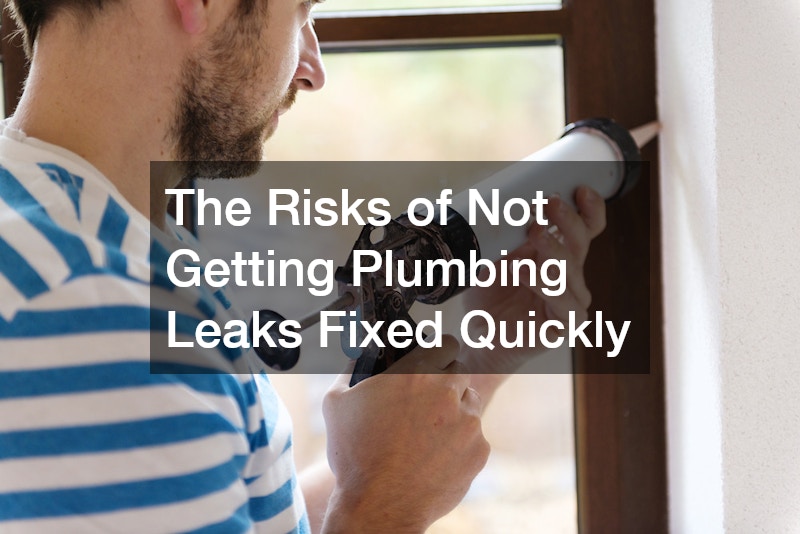A small drip under the sink or a faint water stain on the ceiling might not seem like an emergency at first. It is easy to tell yourself that you will deal with it later, especially when everything else in your home appears to be working. The problem is that plumbing leaks rarely stay small. Without prompt attention and proper leak detection, those minor issues can quietly grow into major headaches that affect your home, health, and wallet.
Hidden Water Damage and Structural Problems
Water has a way of spreading far beyond the original leak. A slow drip inside a wall or beneath a floor can soak insulation, drywall, and framing over time.
Materials that are constantly exposed to moisture can weaken, warp, or rot, even if you do not see obvious puddles. By the time discoloration or sagging shows up on a wall or ceiling, the damage behind it may already be extensive. Early leak detection can reveal hidden trouble before it compromises your home’s structure.
If leaks continue unchecked, they can lead to more serious structural issues. Floor joists, subfloors, and beams may deteriorate to the point where they no longer support weight properly. In extreme cases, this can cause floors to feel spongy, doors and windows to stick, or walls to crack. Repairing this kind of damage is often far more expensive and disruptive than fixing the original plumbing leak promptly.
Mold Growth and Indoor Air Quality Concerns
Moisture and darkness create ideal conditions for mold and mildew. A small leak behind a cabinet, under a tub, or in a crawl space can provide the perfect environment for spores to thrive. Once mold begins to grow, it can spread across surfaces and into porous materials like drywall and wood. Even if you cannot see it, you might notice musty odors or experience more dust and allergies in your home.
Mold can worsen respiratory problems and trigger symptoms such as coughing, sneezing, and irritated eyes, especially for people with asthma or allergies. Addressing the source of moisture is the only long-term solution. Professional leak detection helps pinpoint exactly where water is entering, so the plumbing repair and any necessary mold cleanup can be handled at the same time. The longer you wait, the more difficult and costly that cleanup becomes.
Higher Water Bills and Wasted Resources
Even a slow, steady drip can waste a surprising amount of water over weeks and months. You might not notice small changes at first, but over time your utility bills can creep up as the leak continues. If you receive a surprisingly high bill for no obvious reason, a hidden leak may be to blame. Ignoring it means you are literally paying for water that never benefits your household.
Beyond the financial impact, untreated leaks contribute to unnecessary water waste. Responsible water use matters, especially in areas that experience drought or have water restrictions. Quick repairs supported by accurate leak detection let you stop that waste at the source, preserving both your budget and an important resource.
Damage to Fixtures, Appliances, and Belongings
Leaks do not just affect walls and floors. They can also damage fixtures, appliances, and personal items. Water heaters, dishwashers, washing machines, and refrigerators with water lines all depend on tight connections and dry surroundings. Persistent moisture can cause metal components to rust, electrical parts to fail, and seals or gaskets to break down sooner than they should. That can shorten the life of expensive appliances and force you into premature replacements.
Personal belongings are also at risk. Boxes stored in basements, items in cabinets, and furniture near leaky pipes can be ruined by ongoing moisture exposure. Photos, documents, and sentimental items may be damaged beyond repair if leaks are not found and fixed early. Regular checks and timely leak detection can help you catch issues before they reach your valuables.
Insurance, Liability, and Long-Term Costs
Many homeowners assume that insurance will cover water damage no matter what, but policies often distinguish between sudden, accidental events and damage caused by neglect. If an insurer determines that you ignored obvious signs of a leak, they may reduce coverage or deny a claim. That leaves you paying out of pocket for repairs that could have been minimized with earlier action.
On top of that, long-term moisture problems can complicate future home inspections if you decide to sell. Evidence of past leaks, mold, or structural damage can raise red flags for buyers and inspectors. Addressing leaks promptly, and documenting repairs supported by proper leak detection, shows that you have taken good care of the property. That can protect your investment and make any future sale smoother.
Postponing leak repairs is a gamble that rarely pays off. Small plumbing issues have a way of growing quietly until they demand attention at the worst possible time. By acting quickly when you notice damp spots, unusual sounds, or higher water bills, you can protect your home’s structure, your health, and your budget. Prompt repairs, guided by thorough leak detection, help keep your plumbing system reliable and your home comfortable for years to come.






